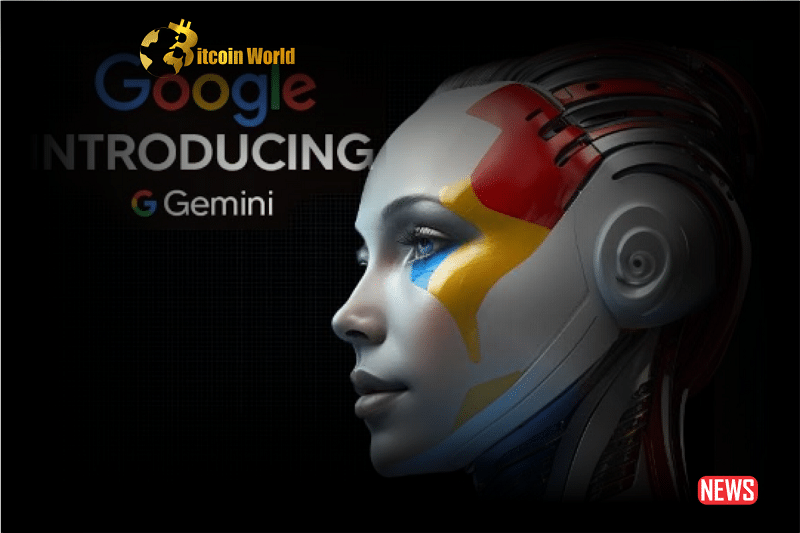The tech world is buzzing, and the reason? A bold claim by research firm SemiAnalysis: Google’s upcoming Gemini AI model isn’t just playing in the same league as OpenAI’s offerings; it’s potentially lapping the competition with a staggering leap in processing power. This news has ignited a firestorm of discussion, leaving everyone from seasoned tech analysts to casual enthusiasts eagerly awaiting the unfolding drama.
A David and Goliath Scenario or a Change of Guard?
SemiAnalysis dropped a bombshell, suggesting Gemini boasts a processing prowess five times greater than OpenAI’s current champion. Imagine that kind of computational muscle! The report, meticulously crafted by Dylan Patel and Daniel Nishball and aptly titled “Google Gemini Eats The World – Gemini Smashes GPT-4 By 5X,” paints a picture of Google, armed with superior processors, poised to redefine the AI landscape. But does raw power translate directly to superior AI performance? That’s the million-dollar question.
Enter Sam Altman, the CEO of OpenAI, who responded to these claims with a healthy dose of skepticism. His tweet, dripping with wry amusement, hinted that the data might be a cleverly curated snapshot from Google’s internal marketing playbook. “Incredible how Google managed to convince that Semianalysis individual to broadcast their internal marketing/recruiting chart—lol,” he quipped.
What Makes Gemini a Potential Game Changer?
At the heart of this excitement is Gemini, Google’s ambitious multi-modal AI model currently under development at DeepMind. Slated for release later in 2023, Gemini promises a significant advancement in AI capabilities. But what does “multi-modal” really mean?
- Beyond Text: Unlike many current models primarily focused on text, Gemini is designed to process a wider range of information, including text, video, audio, and images.
- Versatile Output: It won’t just understand diverse inputs; it can also generate both textual and visual outputs. Think of it as a true multimedia maestro.
- Stepping Ahead: While ChatGPT has captured widespread attention, its limitations in handling non-textual data put it at a potential disadvantage compared to Gemini’s broader capabilities.
Is More Compute Always Better?
The core of the SemiAnalysis argument hinges on Google’s superior processing capacity. But is it a straightforward equation? Does more computational power automatically equal better AI?
Python programmer and AI enthusiast ‘Teknium’ offers a nuanced perspective: “I fervently hope that someone manages to unseat OAI soon. But, to be clear, claiming that Gemini outperforms GPT-4 by 5x is deceptive; it’s an issue of 5x compute, not necessarily 5x quality.” This highlights a crucial point: algorithmic innovation, training data quality, and architectural design also play pivotal roles in determining AI performance.
The Broader AI Battlefield: It’s Not Just a Two-Horse Race
While the spotlight is currently on Google and OpenAI, it’s important to remember that the AI arena is teeming with innovation. Other tech giants like Meta are actively developing their own powerful AI models. This competitive landscape suggests a year of significant advancements and potential disruptions in the world of Large Language Models (LLMs).
Challenges and Considerations
Despite the excitement surrounding Gemini, Google isn’t without its challenges. The company is currently facing a class-action lawsuit alleging the misuse of consumer data for AI training purposes. This underscores the ethical considerations and potential pitfalls in the rapid development of AI technologies.
Strategic Partnerships: Google’s Collaborative Approach
Google is also strategically forging alliances to strengthen its position in the AI ecosystem. Collaborations with industry heavyweights like Meta and Anthropic aim to integrate their AI models into the Google Cloud platform. What does this mean for businesses?
- Expanded Access: Google Cloud customers gain access to powerful LLMs like Meta’s Llama 2 and Anthropic’s Claude 2.
- Customization Capabilities: These models can be fine-tuned using enterprise-specific data, offering tailored solutions.
- Cutting-Edge Tools: Businesses gain access to advanced AI tools for their own applications and services.
The Quest for AI Dominance: Echoes of the Search Era?
Google’s ambitions are clear: to replicate its dominance in internet search within the realm of generative AI. By positioning itself as the go-to platform for cloud clients seeking cutting-edge AI, Google is making a significant play for market leadership. Their collaboration with Nvidia further emphasizes their commitment to accelerating the development of massive AI models.
What Does the Future Hold?
The impending arrival of Google’s Gemini AI model marks a pivotal moment in the ongoing AI revolution. In a landscape characterized by fierce competition and rapid innovation, the potential impact of Gemini is undeniable. But several key questions remain:
- Will Gemini truly live up to the hype surrounding its processing power?
- Can Google effectively challenge OpenAI’s established position in the market?
- How will other players in the AI space respond to this escalating competition?
The Bottom Line: The AI Arena is Heating Up
The race for AI supremacy is far from over. The claims surrounding Google’s Gemini have undoubtedly shaken things up, setting the stage for an exciting showdown between tech titans. Whether Gemini’s impressive processing prowess will translate into a decisive victory remains to be seen. One thing is certain: the world will be watching with bated breath as this technological drama unfolds, shaping the future of artificial intelligence as we know it.
Disclaimer: The information provided is not trading advice, Bitcoinworld.co.in holds no liability for any investments made based on the information provided on this page. We strongly recommend independent research and/or consultation with a qualified professional before making any investment decisions.




